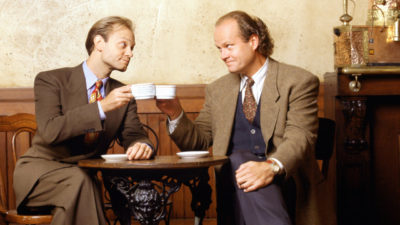Appearances can be deceiving. Awhile back, I wrote a post about how, despite the blatant immorality and atheism, the TV show House, M.D. actually has a more biblical worldview than you might expect. On the flip side, I’ve seen many shows that, while they seem much more moral on the surface, can actually harbor far more dangerous messages. I think it’s a bit like the principle that a lie is always stronger when mixed with truth. Blatant immorality is fairly easy to spot. But immorality covered in the frosting of ethical characters and happy feelings? That’s a little bit sneakier.
Case in point is a show I recently finished watching, the 90”s sitcom Frasier. Frasier and his brother Niles are portrayed as having their faults, but overall being moral, ethical, even noble characters. Their egos sometimes get in the way, but their commitments to honesty and kindness are endearing. And they always make the right choice in the end, or at least learn from their bad choices.
Or do they?
In fiction, as in reality, we have a built in tendency to get behind and defend those we care for. This springs from empathy–I see your side, and I understand how you feel, and I want you to be happy. Ergo, I want for you what you want for yourself. The problem with this is that, as fallen human beings, what we want for ourselves may not be what is best for us, for others, or what is right. Thus this intrinsically selfless impulse must sometimes be curbed for the sake of truth and morality. In real life, this is difficult. But sometimes on television it’s even harder, because the producers are actually creating their own reality. They are bound only to truth in a superficial way, and they can twist things just enough to fool us, often without even realizing it. One example is the normalization of homosexual characters on television. If we see it enough on the screen, we start to believe it.\n\nWhat does this have to do with Frasier?\n\nA running theme throughout the early seasons is Niles Crane’s obsession with and adoration for his father’s physical therapist, a lovable Brit named Daphne Moon. He gazes adoringly at her when they’re in the same room, pines after her for years, and frequently displays the sweetest and most desperate desire just to be near her. Sounds innocent enough, except for one inconvenient fact–Niles is married.
I, as a Christian, know while watching this that the truth is that it’s wrong for Niles to lust after another woman while he’s a married man. I know that it’s wrong for me to want him to leave his wife for Daphne. I know that I’m actually condoning sinful behavior if I condone his actions.
But they’re just so adorable, and they’re so perfect together, and I care about him, and his wife is such a joke anyway…
Once I learn to condone fictional infidelity, my mind begins to see this as acceptable behavior. If I’m not careful, I’ll soon condone factual infidelity as well. And that is neither endearing nor innocent.
Life can be messy, and people can make mistakes, and they can sin in terrible ways against each other and against God. It happens. And our stories would do well to reflect that. But it matters how we portray those evils. Do our audiences leave our creations rooting for immorality or saddened by it? It’s a fine line to walk, one I myself often struggle with both as a creator and a consumer. But awareness, I believe, is half the battle.
The gray areas in life reflected in our stories may at times require a similarity with tossed salad and scrambled eggs, but let’s not leave our readers with tossed consciences and scrambled minds.
